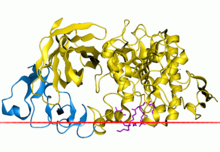Pancrelipase

Complex of lipase with colipase
|
|
| Clinical data | |
|---|---|
| Trade names | Creon, Pancreaze, Pancrex, others |
| AHFS/Drugs.com | Monograph |
| MedlinePlus | a604035 |
| Pregnancy category |
|
| Routes of administration |
by mouth |
| ATC code | |
| Identifiers | |
| CAS Number | |
| DrugBank | |
| ChemSpider |
|
| UNII | |
| ECHA InfoCard | 100.053.309 |
Pancreatic enzymes also known as pancrelipase and pancreatin, are commercial mixtures of amylase, lipase, and protease. They are used to treat malabsorption syndrome due to pancreatic problems. These pancreatic problems may be due to cystic fibrosis, surgical removal of the pancreas, long term pancreatitis, or pancreatic cancer among others. It is taken by mouth.
Common side effects include vomiting, abdominal pain, constipation, and diarrhea. Other side effects include perianal irritation and high blood uric acid. The enzymes are from pigs. Use is believed to be safe during pregnancy. The components are digestive enzymes similar to those normally produced by the human pancreas. They help the person digest fats, starches, and proteins.
Pancreatic enzymes have been used as medications since at least the 1800s. They are on the World Health Organization's List of Essential Medicines, the most effective and safe medicines needed in a health system. In the United Kingdom a typical month supply costs the NHS about 11.64 pounds. In the United States a month of treatment typically costs 50 to 100 USD.
Pancrelipases are generally a first line approach in treatment of exocrine pancreatic insufficiency and other digestive disorders, accompanying cystic fibrosis, complicating surgical pancreatectomy, or resulting from chronic pancreatitis. The formulations are generally hard capsules filled with gastro-resistant granules. Pancrelipases and pancreatins are similar, except pancrelipases has an increased lipase component.
...
Wikipedia
